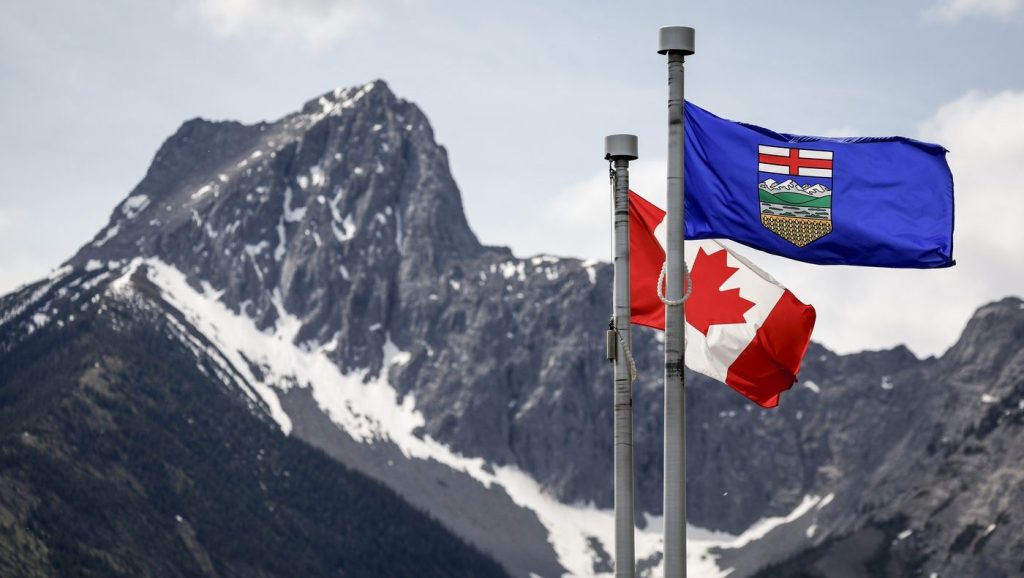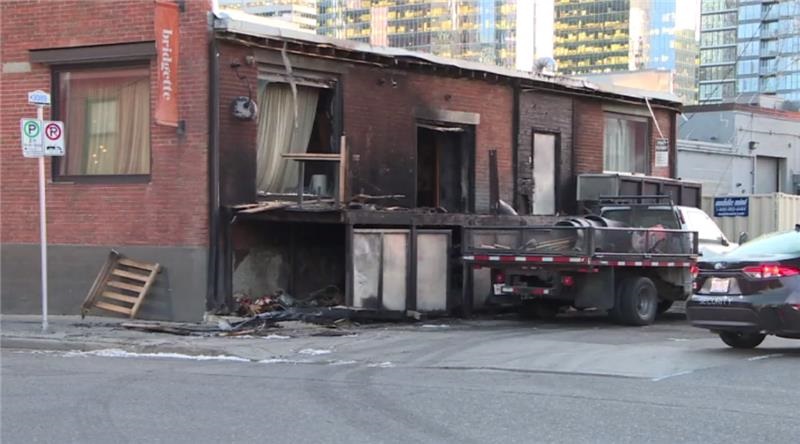‘Learn the lessons of 2020’: Mayor Nenshi looks back on a challenging year
Posted Dec 31, 2020 8:00 am.
Last Updated Dec 21, 2020 1:39 pm.
This article is more than 5 years old.
CALGARY (660 NEWS) — This year has been a tough one for almost everyone, but for those in charge of protecting the public as a whole while managing the province’s largest municipal government, it was even more challenging.
For over 10 years, Mayor Naheed Nenshi has been at the helm in the City of Calgary and had already overseen some of the most devastating disasters before the COVID-19 pandemic began. But it didn’t end there as several other major issues grabbed headlines as the months wore on.
“We dealt with five things, all at the same time. Each of which would have been the story of the year easily without the others,” Nenshi tells 660 NEWS in a year-end interview.
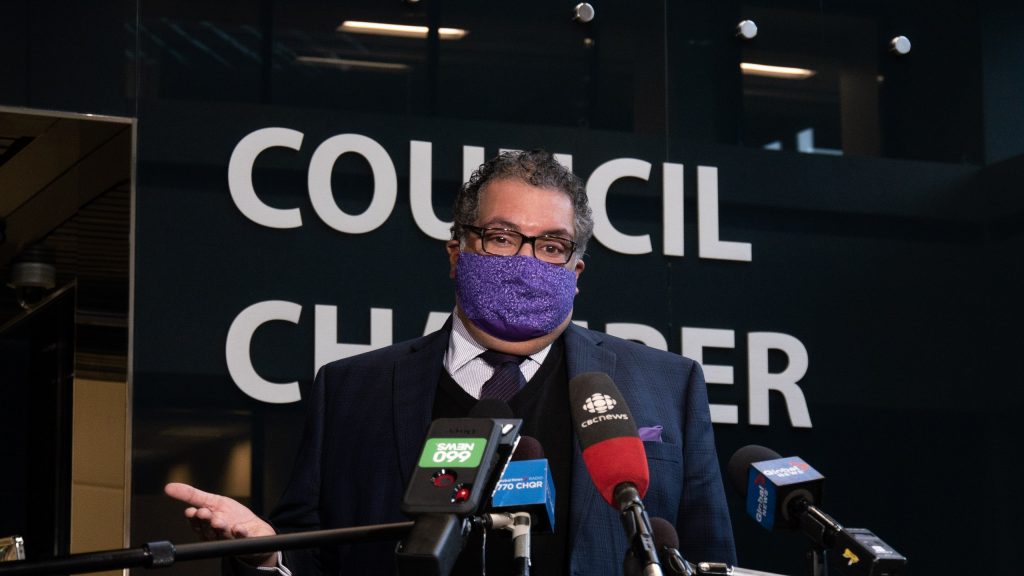
Calgary Mayor Naheed Nenshi speaks to media at city hall as COVID-19 cases continue to rise and speculation grows about a possible lockdown in Alberta. Monday, Nov. 23, 2020.
Of course, the COVID-19 pandemic tops the list, which then resulted in an economic crisis. An ongoing mental health and addiction crisis was exacerbated by this situation, and then there was the massive hailstorm in June that decimated thousands of homes and cost over a billion dollars in damage. Finally, a global movement bringing attention to systemic racism brought out thousands of protestors to Calgary’s streets in solidarity with demonstration that were sparked by the killing of George Floyd in Minneapolis.
APPROACHING THE PANDEMIC
Starting with the pandemic, Nenshi vividly remembers the day everything started to turn more serious. It was Mar. 14 when the province announced schools would have to close and restrictions would need to be imposed to combat the sudden rise in infections, at a time when we still knew desperately little about the virus spreading around the globe.
On that Saturday evening, Nenshi was joined by Calgary Emergency Management Agency Chief Tom Sampson to announce a state of local emergency. It was the first time an emergency had been declared since the 2013 floods that devastated the downtown core and low-lying communities around the rivers.
“That weekend, St. Patrick’s Day was coming, we were worried about spread and we were worried about bars. We were getting a lot of concern from our community partners like rec centres and libraries about what we needed to do, and decisions we being made really, really quickly,” Nenshi recalled about that night.
“So, I remember looking across the table at Tom Sampson, and saying, ‘don’t tell me why I should declare a state of local emergency, tell me all the reasons I should not.’ And, ultimately, we came down very quickly on the side of we have to protect people. Our number one job is to protect people.”
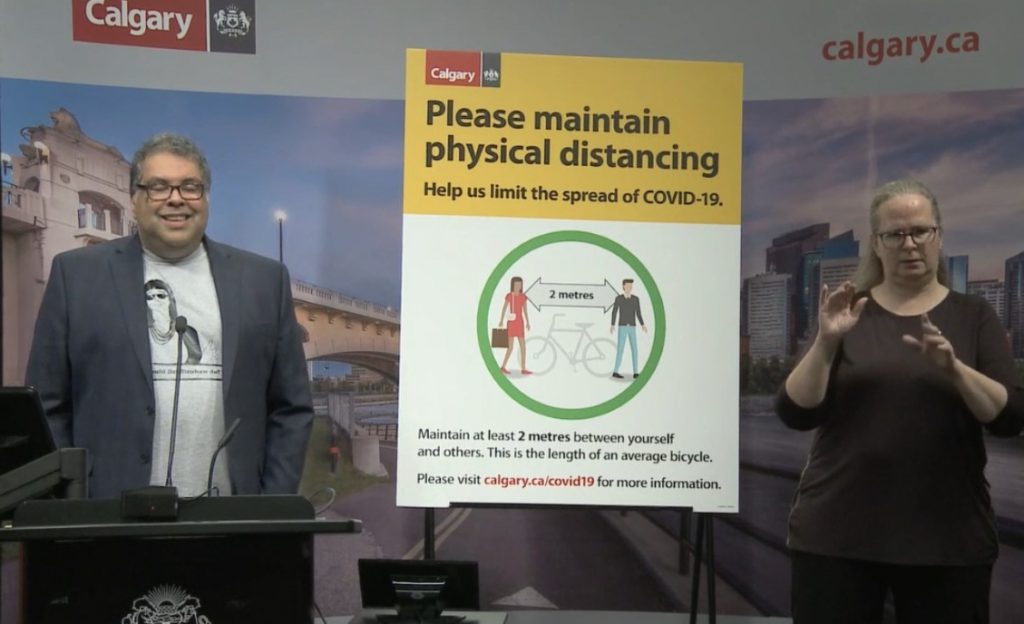
Mayor Naheed Nenshi provides an update on more closures coming for the City of Calgary March 27
Nenshi said it was an easy decision at this time, due to the immediate stressors and the whirlwind week that had already happened to that point. He said the second state of emergency declared later in the pandemic on Nov. 25 was a much tougher choice. This made for two local emergencies during this pandemic, and only the third in the more than 136-year history of the city.
“And lucky me, I got to be the mayor for all three of them,” Nenshi said.
The mayor remained extremely grateful for the tireless work of Sampson, who had been charged with managing most emergency operations during the vast majority of the pandemic. But the veteran of emergency services decided it was time to retire at the end of November, with former Deputy Chief Sue Henry rising to the top of the organization and taking the place of her mentor.
Nenshi is completely confident that the city remains in strong hands and we will stay well-prepared to manage what else is thrown our way.
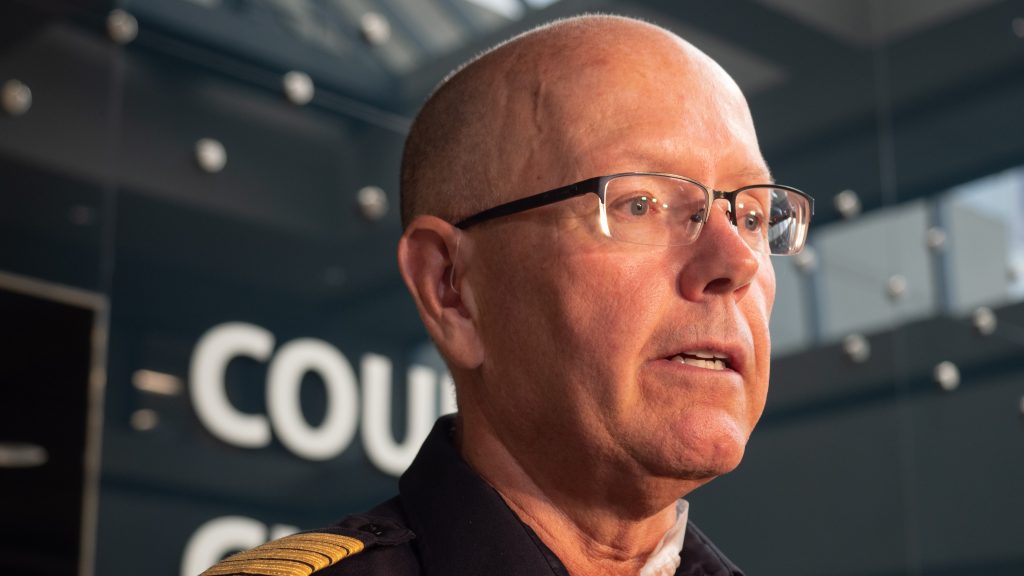
Calgary Emergency Management Agency Chief Tom Sampson tells reporters about the city’s approach to the coronavirus outbreak. March 11, 2020. Sampson retired from the role at the end of November.
But beyond the governance issues that have been present in the pandemic, such as instituting a face covering bylaw that later resulted in demonstrations from what he called a radical fringe of citizens, he said this has overturned many of the plans he had for the year and took him a direction that certainly was not expected.
Nenshi remembered how at the beginning of the year, he had stayed in eight hotels in the first eight weeks of the year until the virus started to grow out of control. He barely travelled at all in the months that followed.
Meanwhile, at home where Nenshi lives with his elderly mother, he said that he feels an extra obligation to follow public health guidelines that he preaches about in order to keep his loved ones safe.
“She’s very used to me coming home really late at night, she always jokes that she doesn’t really live with her son, she has sort of an absentee roommate who shows up and does laundry once in a while,” he said. “But she too understands how important this is. She understands the importance of protecting her own health, but more important protecting the health of other seniors.”
By and large, citizens of the city have performed very well with this new normal, although Nenshi is still concerned about those who try to break the rules.
“What’s made this more difficult is the very small number who believe in fake news. Whenever anyone says to you ‘this is fake news’, it means they’ve been listening to conspiracy theories. A little bit of hatred and division in there, as well. Basically, people who are flagrantly putting others at risk,” Nenshi said. “That’s made it tough. As I’ve said, you have every right to be an idiot, you don’t have the right to put others at risk.”
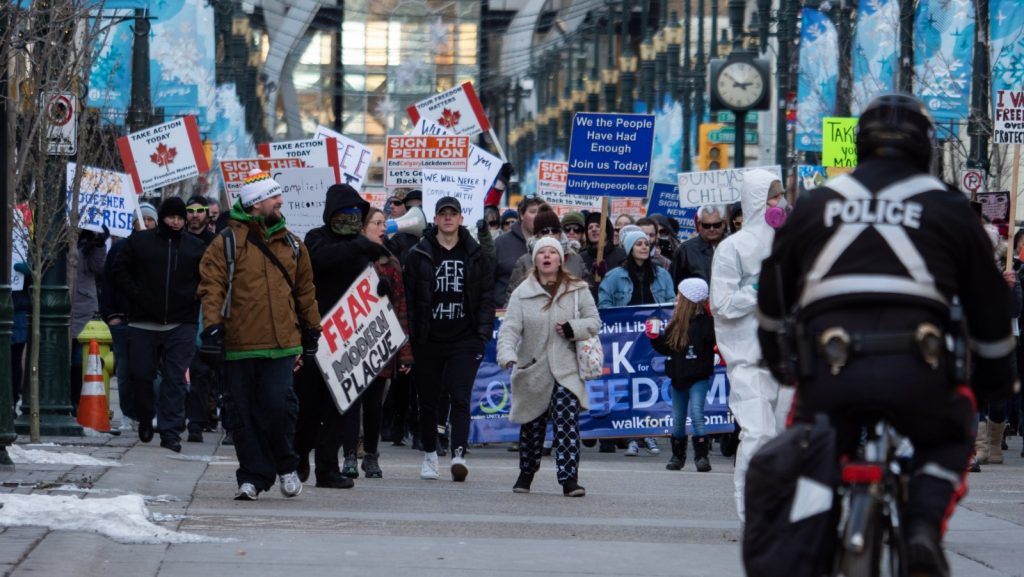
Anti-maskers march along Stephen Avenue in protest to rules around COVID-19, as they cast doubt on the dangers of the virus. Saturday, Nov. 28, 2020.
But throughout all of this chaos, there has been one word that stuck out to the mayor, especially as he talked to children in schools. He feels it is an attitude that permeates across the city.
“I always ask students, what is your biggest lesson of 2020?” he said. “And invariably there’s a student who uses a word that I didn’t know elementary school students knew, and they say, ‘in 2020, I learned to be resilient.’ I learned to roll with the punches and be flexible and even if things look different and weird and I didn’t like it, I learned to live with it.
“I hope we can all remember that lesson too.”
COMBATING SYSTEMIC RACISM IN CALGARY
Apart from the pandemic, the topic that Nenshi feels will have some of the most everlasting impact on the future of the city is the racial reckoning, with widespread protests decrying system racism, policy brutality and white supremacism.
“In the long arc of history, it’s always dangerous to make pronouncements about history while you’re living it. You’re always going to be wrong. But I’ll take that risk,” he said. “The conversations that we’re having right now about racism will probably be the most consequential to the future of our community.”

Thousands of protestors march down 8th Street SW in downtown Calgary during a Black Lives Matter demonstration. Wednesday, June 3, 2020.
Nenshi said this will key to determining if Calgary can be the shining city on the hill that he has long imagined.
“I think we learned this summer, or relearned, about how many of our neighbours for which that is not true. Particularly our Black and Indigenous neighbours and other people of colour.”
He said if the efforts being made now can be followed through and people join together in celebrating Calgary as a multicultural hub, then it will make the future brighter for everyone.
Within the council chambers at city hall, Nenshi added that decisions made by him and his colleagues are playing a pivotal role as well and hails the creation of an anti-racism strategy as one of the year’s top accomplishments.
“We had three days of unprecedented hearings at city council on racism in Calgary. It was hard for me, and the way I got there was we have to reconcile two simultaneous things in our mind,” he said. “Yes, we are pluralistic place, we should proud of that and should have the right to be proud of that, but also we have to be able to get from being multicultural and diverse to being truly an actively anti-racist.”
Nenshi also brings up the devastating hailstorm in northeast Calgary in this part of the conversation, and while on the surface it doesn’t seem like it relates to the problems with systemic racism, he would beg to differ as the disaster affected one of the largest immigrant populations in the city.
When hailstones rained down on Jun. 13, causing over a billion dollars in damage to thousands of homes and vehicles, people in the northeast were left wondering if anyone would come to their aid. The storm exacerbated issues that were already causing problems through the community, especially relating to the pandemic.
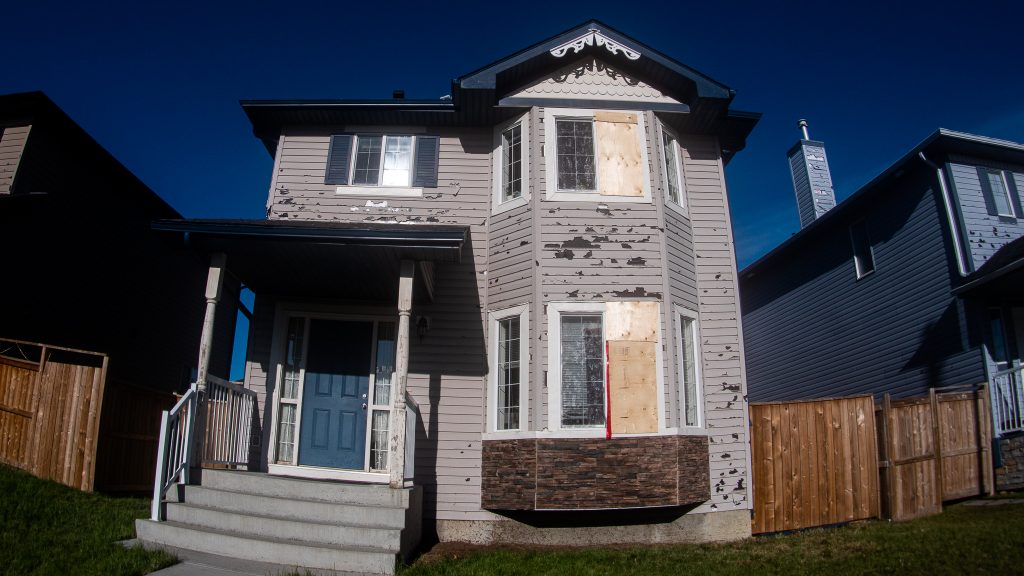
Hail tore off the siding and smashed windows of this home in northeast Calgary after a large storm rolled through the city on Jun. 13, 2020.
“I think one of the things that COVID has really reminded us of and brought us to is the simple fact that our great, amazing community and society wasn’t always great and amazing for everyone. It has exposed economic weaknesses, it has exposed the fact that the people providing essential services are often the lowest paid people and the most exploited people in our economy. It’s reminded us that for a lot of folks, questions that we have around how to manage a pandemic, how to manage public health are questions that come from a root of a certain kind of privilege,” he said.
Since he lives in the northeast, Nenshi said he is constantly reminded about the storm — which was also named the most significant weather event in Canada this year — every time he looks out the window and sees a neighbouring home that is still damaged.
With a seemingly never-ending supply of disasters to strike people in the area, Nenshi said there is certainly a feeling of despair.
“Meanwhile, folks are just trying to go to work,” he said. “And we’re sending them into a situation where they can be at risk, where they might not have the money to fix their house when they get home, those hurt in the storm.
“When we say that we’re trying to keep the economy open to protect the poor and the vulnerable, we have to understand that in some case what we’re doing is we’re sending the poor and vulnerable into danger.”
But in the end, Nenshi said this can be another moment to learn a lesson from this year and hopefully set the stage for a more level playing field that does not leave anybody behind.
“I hope that we’ll be able to remember that everyone has rights.”
KEEPING CALM AT CITY HALL
One topic that seemingly continues to grab headlines in Calgary is the drama that unfolds at city hall among the councillors sitting around the horseshoe in the council chambers. There have been entertaining debates, barbs thrown on social media, and cliques formed between some of the councillors. And even though meetings are being held almost totally virtually, this has not stopped the moments of contentiousness.
But amid all of that, Nenshi said he is extremely proud of everyone involved in managing the municipal government and some significant achievements were still made.
“We’ve had four budgets in a row where the tax increases have been far below inflation plus growth, we’ve managed to deliver a lot of services with very high levels of citizen satisfaction, we have been able to take cost our of the system, we still have the lowest residential taxes in the country,” Nenshi said. “And, we’ve been investing in the city.”
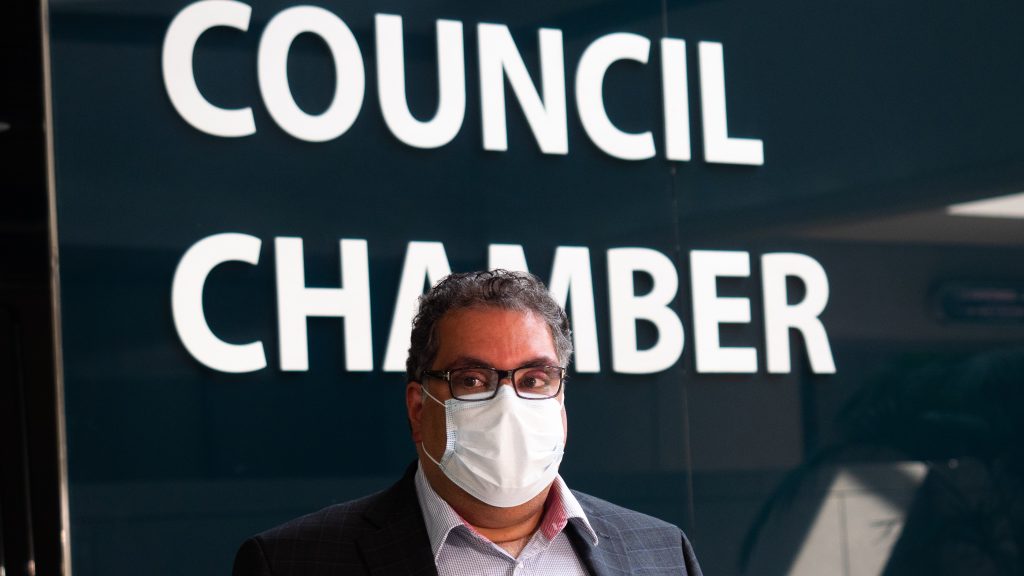
Mayor Naheed Nenshi wears a mask while speaking to the media at City Hall on Thursday, July 16, 2020.
There was further growth in transit, both with expanding the MAX bus lines and approving the multi-billion dollar Green Line LRT which would bring transit service to many under-served communities through the city with a planned completion in 2026 — even if there were some hiccups involving the provincial government late in the year.
Speaking of the provincial government, tension between the city and the United Conservative Party has been well noted, too, but Nenshi said he has still managed to develop a good working relationship with Premier Jason Kenney as they both try to tackle the COVID-19 pandemic.
“So, I’m really hopeful that once this is behind us, and I do believe it will be behind us someday, that we continue being cooperative. Because ultimately, that’s what serves citizens.”
The same feeling is expressed about his councillor colleagues, because even with some moments of drama there has been a clear common goal to help the city move forward strongly.
“Yeah, the council meetings are a bit funny and sometimes they’re a bit comedy, and sometimes they’re a bit drama and a bit frustrating, but ultimately I think the council has been able to achieve enormous things in very difficult circumstances,” he said. “All of that is a sideshow. I think that council needs to be judged on what it’s actually accomplished.
“I think that the best thing that council did this year was really show extraordinary unity in dealing with the COVID crisis.”
WHAT THE FUTURE HOLDS FOR CALGARY
During the conversation, and throughout the course of the year as we approach another municipal election in 2021, there is one question on the tip of everyone’s tongue. Will Nenshi run again and seek a fourth term as Calgary’s mayor?
While speculation has been swirling for months, Nenshi maintained that he honestly still has not made a decision.
“My procrastination is getting the worst of me,” he said. “I really ought to have made a decision by now, and I just haven’t.”
Hopefully, that can be settled after the holidays but there is also just an overall focus on making sure the city can continue to confront the pandemic.
“I just don’t have the luxury to think about politics right now,” he added. “I do love politics, and there will definitely be time to deal with it, and we will get to that some time soon.”
Even so, Nenshi is still able to look ahead well past that October election and has a vision for what the city should be trying to accomplish once a new administration is settled in. By that time, we should also ideally be past the worst part of the pandemic and starting to move ahead with major projects and initiatives.
“I think that that cliche that you’re hearing in a lot of places — build back better — really needs to be the mantra of the new city council. The new city council is going to inherit a tough situation,” Nenshi said.
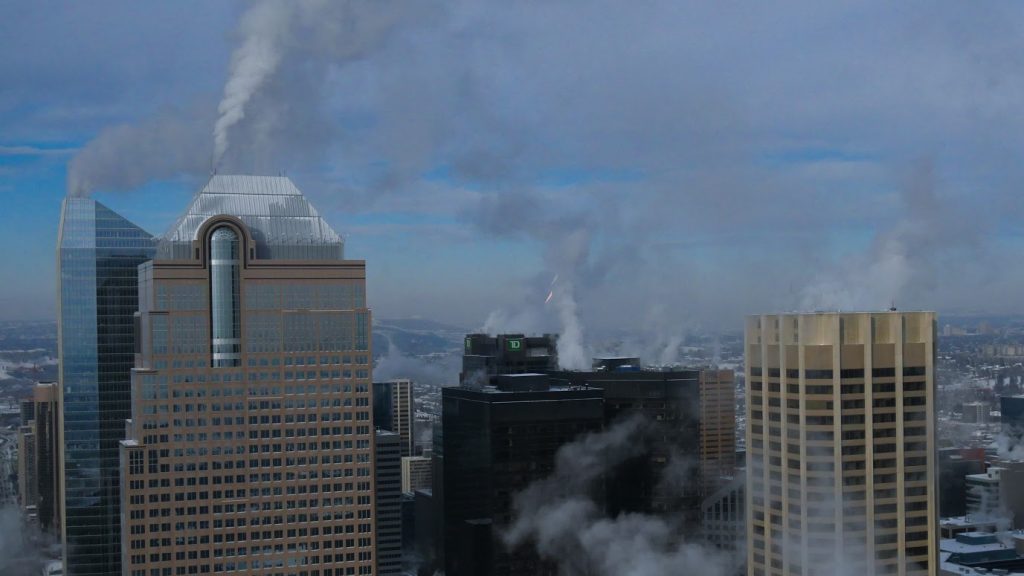
A combination of the public health crisis and ongoing economic struggles have left many downtown Calgary office towers largely vacant, with many searching for how to fill them up again.
There has to be a clear plan to try and bring back jobs to the city, and there has to be people who can rise to a moment “of crisis but also of great creation.”
“Of course, they’re going to have to make sure that the Green Line is on time and on budget. They’re going to have to continue to make investments in the important things that improve quality of life in the city. They’re going to have to be almost singularly focused on economic development and economic growth.”
But while at the same time there is a feeling that we should try to return to the so-called “good old days”, Nenshi said we can take a tough year and use it as a way to motivate us to make the city a better place to live.
“That’s really the mindset that the new council needs to take in every single one of its decisions. What are we trying to build?”
A FINAL GOODBYE TO 2020
Like most other people around the world, Nenshi is certainly looking forward to one thing: bidding farewell to 2020.
While all of the problems that have popped up in the last 12 months will not suddenly disappear come midnight on Jan. 1, there’s a lot that we can take away to try and improve the situation for the coming 365 days.
“Christmas is going to be different, and 2020 has taken so much away from us. You know what? It’s okay to be angry, it’s okay to be sad, it’s okay to mourn and grieve all the things we lost. It’s okay, it’s just human and I do it every single day,” Nenshi said. “But let’s also learn the lessons of 2020. Lessons about what we’re capable of, lessons about what we’re capable of, lessons about what we can take and bounce right back, lessons about how we can all live together and progress together.”
Nenshi said, just like during the 2013 floods, Calgarians stepped up to help each other. There were food drives, people supporting others in isolation, sewing thousands of masks, and other acts of heroism. Even protests in support of the Black Lives Matter movement indicated a deep desire among many citizens to make sure nobody is left behind and we can all move forward together, arm in arm.
He thinks that these are the things that truly shaped the year and can pave the way to a much better 2021.
“I hope that we all join me in my New Year’s resolution,” Nenshi concluded. “May I never, ever forget 2020. May I never forget the tough times, may I never forget the hard times. But also, may I never forget what we’re capable of. May I never forget that compassion and caring and community. And may I never forget how people have the power to change one another’s lives.”
